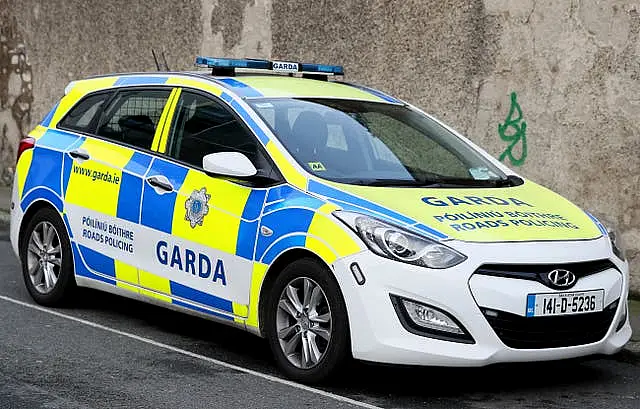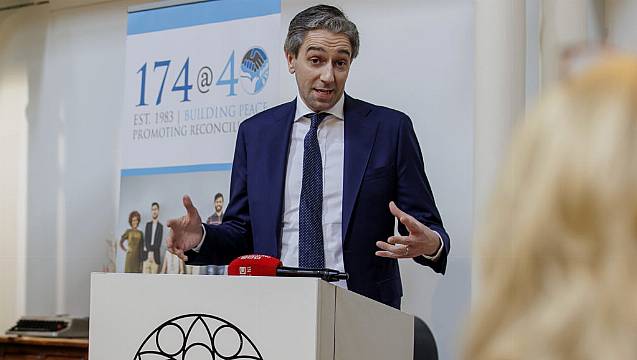Playing politics with the Hate Crime Bill is “reckless and dangerous”, a campaign group has warned, as new figures show a rise in hate crimes.
Martin Collins, co-director at Pavee Point, said political parties that previously supported the proposed legislation are now “wavering” over the Bill.
Taoiseach Simon Harris has said he will pass an amended version of the hate speech legislation before the next general election.
Politicians have been wrangling over the wording of the Bill, which aims to introduce laws that would see “hate” become an aggravating factor in certain offences.
Today, the Coalition Against Hate Crime is holding a press conference responding to new @gardainfo stats showing a 12% increase in hate crime and hate-related incidents in 2023.
Hate crimes hurt us all. We urgently need legislation to address these harms. pic.twitter.com/cDkBdEhJOoAdvertisement— Irish Council for Civil Liberties 🏳️🌈 (@ICCLtweet) May 8, 2024
New figures have revealed that there has been a 12 per cent increase in the number of hate crimes and hate-related incidents reported to gardaí.
The force said some 651 hate crimes and hate-related (non-crime) incidents were recorded in 2023, up from 582 in 2022.
These include 548 hate crimes and 103 hate-related incidents, up from 510 and 72 respectively in 2022.
The Coalition Against Hate Crime, a group of 23 civil society organisation, is calling on the Government to recommit to the Hate Crime Bill.
Sinn Féin and some government politicians, including Fine Gael TDs Charlie Flanagan and Michael Ring, have called for the hate speech draft laws to be scrapped entirely.
Sinn Féin’s TDs voted in favour of the Bill in the Dáil last April.
Speaking in Dublin on Wednesday, Mr Collins said: “There is a sense that there’s a bit of a wavering taking place. How can some individuals and some political parties in a very short space of time give the need for such legislation a ringing endorsement and then on the other hand, a few months later, want to scrap it.
“It beggars belief, but that’s people playing politics with us, which is reckless and dangerous, given the issue that we’re dealing with.”
He appealed to politicians not to “succumb to pressure” to accept “drastic amendments” to the legislation that would effectively make it “useless and meaningless”.
“Those who are opposing it and questioning it, are the people who don’t experience hate crime and hate speech,” Mr Collins added.
“Hate crime is different from other crimes. It’s a message crime and it’s an attack on the community.
“When a Traveller or any other member of a vulnerable group experiences hate speech, and in particular hate crime, if a Traveller experiences hate crime in Donegal, that will send a shiver down the spine of Travellers in Dublin because it’s an attack on the community.”
He added: “We do not have any robust, effective legislation to deal with victims of hate speech and hate crime. There is no proper legal redress and we are an outlier.”
Luna Lara Liboni, policy officer for Irish Council for Civil Liberties (ICCL) and chair of the Coalition Against Hate Crime, said she suspects the rise in hate crime is much higher than what is being reported.
She also said that without hate crime legislation, Ireland has been unable to address hate crime in the criminal justice system.
“Research shows that in the absence of legislation, what happens is that often the hate element, which makes a crime a hate crime gets filtered out, often disappears at the different stages before coming to sentencing and conviction,” Ms Liboni said.
“Legislation will make the invisible visible and recognise the additional harm that such crime causes.”
Padraig Rice, policy and research manager at LGBT Ireland, said that anti-LGBT sentiment is not happening in isolation.
He explained: “It’s tied to an anti-migrant sentiment. It’s tied to an anti-different sentiment.
“It’s a sentiment against anybody who’s outside what they see as the norm. It’s an attack on difference and it’s an attack on diversity.
“The swift passage of the Hate Crime Bill is the first step in tackling hate crimes, but this must just be the start of a process and not the end.
“To effectively address and reduce hate crimes, we need a continued and sustained efforts.
“This work includes training for everybody in the criminal justice system. More community gardai who build up trust with affected communities and enhanced victim support.”

Figures released by gardaí show that the most commonly recorded motive was anti-race (36%), followed by anti-nationality (18%) and anti-sexual orientation (16 per cent).
Gardai said these three motives have been the most common in the past three years, however, anti-nationality overtook anti-sexual orientation to become the second most prevalent motive in 2023.
Meanwhile the largest percentage of these were recorded in public order (27 per cent), followed by minor assaults (16 per cent), criminal damage not by fire (9 per cent) and criminal damage by fire (3 per cent).
The largest proportion (44 per cent) of hate-related incidents occurred in the Dublin Metropolitan Region followed by the north-western region (21 per cent), then southern (19 per cent) and eastern (16 per cent).
In a statement, gardaí said they continue to strengthen their network of diversity officers to support victims and those affected by hate discrimination in communities around Ireland.
At present there are more than 500 Garda diversity officers working across the country who engage with minority communities and individuals on a daily basis to provide them with reassurance and address issues of concern for them.
Chief Superintendent Padraic Jones said that while in one sense it is positive that victims are coming forward to speak to gardaí, it is disappointing that incidents of this nature occur at all.
“Being targeted because of a characteristic has an enormous and often life-altering impact on a victim, and as a society we must continue to reject hate and discrimination. Everyone has a right to live safely,” he said.
“I want to thank all those that support people of all ages and backgrounds who could be vulnerable to this crime, particularly those working in community-based groups, schools, clubs and the voluntary sector who consistently demonstrate to people to live without prejudice toward one another.
“I strongly encourage anyone that has experienced or observed prejudice to please come forward and report those incidents to us.
“I can assure you that we will deal with it professionally and provide our support in any way we can.”







